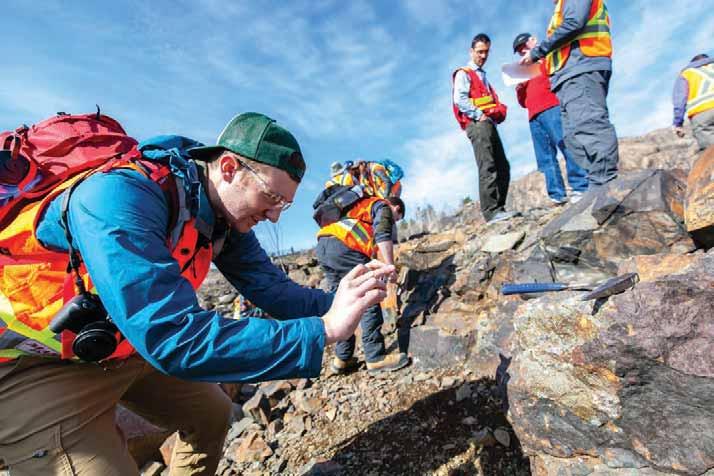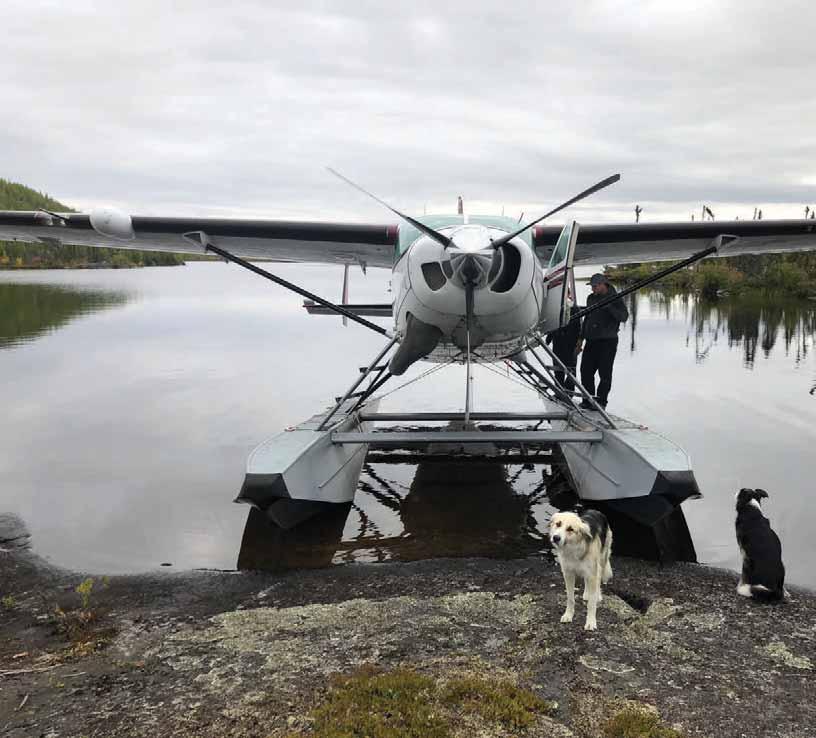
14 minute read
Year in Review
by PDAC
2019 YEAR IN REVIEW
PDAC is proud to be the leading voice of Canada’s mineral exploration and development community, and to represent our 7,500 members in Canada and around the world. Here is a look back at some of the major news stories, developments and political decisions that shaped the sector in 2019.
PDAC co-develops new IFRS resources As 2019 begins, the CPA/PDAC Mining Industry Task Force on International Financial Reporting Standards (IFRS) releases a new report on the capitalization of borrowing costs for mining companies.
As part of the Viewpoint Series, the reports outline factors to be considered in determining whether a mining company should capitalize borrowing costs, including defining qualifying assets, eligible costs and impairments. In addition, they examine leases, recognition issues and how IFRS 16 could impact accounting for some contractual arrangements within the mining industry.
BRITISH COLUMBIA PLEDGES TO MAKE MINING INCENTIVES PERMANENT British Columbia Premier John Horgan announces at Roundup 2019 in Vancouver in late January that his provincial government will make the Mining Flow-Through Share (MFTS) tax credit and Mining Exploration Tax Credit (METC) permanent. The MFTS provides a non-refundable B.C. income tax credit to individuals who have purchased flow-through shares from a company operating in B.C. The tax credit is worth 20% of qualified mining exploration expenditures that the mining company flows through to the individual. The METC is a refundable B.C. income tax credit for eligible individuals and corporations conducting grassroots mineral exploration in B.C., and is worth 20% or 30% of mining expenditures.
PDAC launches webinar series
To engage and inform members on industry developments, PDAC launches a webinar series available on its Members Portal. The first webinar in the series, “Make flow-through financing work for you: Practical tips for the deal and beyond,” provides insight into flow-through shares—an innovative financing tool that helped pave the way for some of Canada’s greatest discoveries. In the spring, PDAC held a second webinar “Small changes, big impact: Enhancing gender diversity and inclusion in mineral exploration”. At the end of the year, a third webinar is launched on “Strategies for strengthening company-Indigenous community partnerships: Examining capacity-related challenges.”
PDAC annual Ottawa Reception
PDAC hosts its annual reception for parliamentarians, department officials and other guests in February to raise awareness about the mineral exploration sector and to highlight the PDAC Convention. PDAC representative, Felix Lee, and Parliamentary Secretary to the Minister of Natural Resources Paul Lefebvre provide welcoming remarks to guests.
Mineral exploration and mining sector at a crossroads PDAC and Oreninc launch the State of Mineral Finance 2019: At the Crossroads report at the start of the PDAC 2019 Convention in March. The report shows that exploration spending jumped more than 30% in Canada and almost 20% globally in 2018. However, the report highlights that financing weakened overall, stalling the investment rebound that emerged over the previous two years as global funding for exploration financing dropped 50% year-over-year. “The mineral exploration and mining industry is still feeling the effects of declining investment across the world, and despite earlier signals that the worst of the downturn was behind us, investor confidence and spending hasn’t fully returned,” says PDAC President Felix Lee.
The report indicates that Canada was not immune but better shielded from declining investment in 2018 as explorationspecific financing fell by roughly half the global decline at around 25% year-over-year. Also notable in 2018 was the +$500 million increase in funds flowing to exploration projects in Africa and Latin America.
NRCan projects Canadian exploration expenditures to drop Shortly after the PDAC Convention, Natural Resources Canada (NRCan) releases estimates indicating that 2019 exploration expenditures are projected to decline by roughly 7% across Canada, versus the year prior. Most alarming in NRCan’s estimates are the significant 20% and 30% spending drops in Yukon and the Northwest Territories, respectively. State of Mineral Finance 2019: At the Crossroads

PROSPECTORS & DEVELOPERS ASSOCIATION OF CANADA
PDAC welcomes Federal Budget 2019
Building on the 2018 Fall Economic Statement, PDAC is encouraged by the Federal Government’s 2019 Budget release in late March that includes measures aimed at helping Canada’s mineral sector enhance its competitiveness and features its global leadership position.
Federal Budget 2019 featured provisions that align with PDAC’s budget recommendations, including investments in Canada’s Arctic and northern regions, skills development, training and apprenticeships, and Indigenous Communities.
Budget 2019 confirmed tax measures, including the Accelerated Investment Initiative and the much celebrated five-year extension of the Mineral Exploration Tax Credit (METC). The extension of the METC until March 31, 2024 is the first multi-year renewal of the METC since its inception in 2000, something PDAC had long championed.
OTHER HIGHLIGHTS FOR THE MINERALS SECTOR INCLUDE: • An increase in the allocation of the National Trade Corridors Fund to northern regions by up to $400 million over eight years, starting in 2020–2021, for a total of $800 million to support infrastructure development. • Enhanced funding to support planning by the Government of Northwest Territories for the proposed Taltson hydroelectricity expansion project. • Additional funding to the Canadian Northern Economic Development Agency for its current economic development program. • Funding for northern and Arctic communities for education and economic development programming. • Investments in initiatives to support universal high-speed internet in rural, remote and northern communities. • Funds for Crown-Indigenous Relations and Northern Affairs Canada to create the Northern Abandoned Mine Reclamation Program. • Initiatives aimed at supporting reconciliation with Indigenous Peoples. • Investments in Indigenous communities to work towards addressing gaps in socio-economic conditions and education. • Investments in skills training, apprenticeship programs for skilled trades, and Indigenous education and training. Federal Government appoints ombudsperson In early April, International Trade Diversification Minister Jim Carr announces the appointment of Sheri Meyerhoffer as Canada’s first Ombudsperson for Responsible Enterprise (CORE). Minister Carr also announces a legal review to consider Canada’s legislative and policy framework regarding responsible business abroad, including an assessment of the application of the Inquiries Act to consider whether to provide the CORE with the tools to compel evidence.
PDAC continues to advocate on behalf of its members for a CORE with a mandate for collaborative dispute resolution using joint fact-finding, and does not support a CORE that is quasi-judicial with powers to compel documents or witnesses. A CORE with a mandate that is non-judicial and focused on joint-fact finding is fundamental to ensuring the CORE is truly constructive, solutions-oriented and credible. Furthermore, the CORE should apply to all Canadian enterprises operating abroad and not just to three sectors.
PDAC SHAPES ONLINE CONVERSATIONS, NAMED TOP DIGITAL INFLUENCER With a score of 85%, PDAC is named the top Mining-Technology.com’s list of digital mining influencers in the first quarter of 2019. GlobalData analyzed and ranked individuals and organizations from around the world who are active online and involved in mining.
Launch of new online community for venture-listed companies The TMX Group launches a new online platform called the TMX Matrix to help investors discover emerging growth companies. Customizable company pages take the mining investor beyond traditional financial metrics with real-time quotes, financing activity, analytics, news, and rich custom content like videos and presentations.
Since its launch, over 200,000 investors have accessed the platform to view company profiles, market data, financing details, and additional company-uploaded materials.
Mining expenditure review table PDAC and Canadian Revenue Agency (CRA) collaborate to tackle the challenges related to Canadian Exploration Expenses (CEE). As a result, CRA publishes an extensive table to help clarify eligibility of various expenses, which we hope will benefit our members.
Amendments proposed to the Excise Tax Act
Finance Canada proposes amendments to the Excise Tax Act (ETA) in May, coming on the heels of a prior proposal and consultation process in mid-2018. Amendments address a 2018 recommendation by PDAC to maintain the current “related tests” for companies operating through subsidiaries. PDAC submits another letter to Finance, highlighting the mineral industry’s concerns with the current proposal.
PDAC LAUNCHES NEW CLIMATE CHANGE WEB PAGE PDAC develops and launches a new web page on climate change. It includes information about government legislation, a Greenhouse Gas (GHG) emissions calculator to help exploration companies predict their emissions, along with case studies, and a guidance on how to reduce GHG emissions at exploration sites.

OSC takes action to reduce the burden on mining issuers The Ontario Securities Commission (OSC) announces in June that mining issuers can request reviews of public technical disclosure before filing a preliminary short-form prospectus. PDAC advocated for this change and applauds the OSC for its efforts in reducing regulatory burden on issuers. “This initiative will provide greater deal certainty to Ontario mining issuers, helping them avoid potentially costly and disruptive delays in the offering process,” says Sonny Randhawa, OSC Director of Corporate Finance.
PDAC ENGAGES IN CHANGES TO PROJECT REVIEWS PDAC continues its active engagement in changes to project reviews in Canada through Bill C-69, Impact Assessment Act. Activities include an appearance before, and a written submission to, the Senate Standing Committee on Energy, the Environment and Natural Resources (ENEV), as well as numerous formal responses to Discussion Papers concerning regulations for the new Act.
PDAC engages in changes to Fisheries Act In support of mineral exploration, PDAC actively engages throughout the year in Bill C-68, which proposes amendments to the Fisheries Act. Involvement includes a submission to the Senate Standing Committee on Fisheries and Oceans (FOPO) and formal responses to Discussion Papers concerning the development of regulations for the Act. PDAC LAUNCHES GENDER DIVERSITY AND INCLUSION GUIDANCE To assist junior exploration and mining companies to improve gender diversity and inclusion in the workplace and in a community setting, PDAC launches “Gender Diversity & Inclusion: A Guide for Explorers”. The resource provides information and practical tools for implementing strategies that cultivate inclusive and diverse environments within companies and the communities they engage within and operate.
PDAC’s Diversity & Inclusion Working Group, comprised of 30 industry experts and leaders from 25 different organizations, collaborated in the development of the Gender Diversity and Inclusion guidance. The guidance becomes available as a standalone document on the PDAC website, and as a new chapter in the e3 Plus Social Responsibility Toolkit.
PDAC to host the Frank Arnott—Next Generation Explorers Award PDAC signs on to host the inaugural Frank Arnott— Next Generation Explorers Award focused exclusively on bringing together the education and mineral resource sectors to address key industry challenges around the utilization and interpretation of exploration-relevant data.
The Frank Arnott challenge provides a means for geoscience students to “bridge the real world skills gap” by working collaboratively on an unstructured problem that will hone both their university-acquired and collaborative group skillsets on relevant applications used in the minerals exploration industry. The finalist presentations and awards ceremony will take place at the PDAC Convention starting in 2021.
Gender Diversity and Inclusion: A Guide for Explorers
ADDRESSING CANADA’S DECLINING MINING COMPETITIVENESS In July at the Energy and Mines Ministers’ Conference (EMMC) in Cranbrook, British Columbia, industry leaders propose recommendations for government action through the Canadian Minerals and Metals Plan (CMMP). The Canadian Mineral Industry Federation (CMIF), of which PDAC is a co-chair, proposes the following recommendations in support of the CMMP’s ambitious strategic directions:

1. Economic Development, Regulatory Certainty and Investment Competitiveness These include the effective and efficient regulation of the mining industry, such as sound implementation of the new Federal Impact Assessment Act, appropriate access to prospective lands, and continued and expanded investments in remote and northern infrastructure. Additionally, it is important that a strategic review of Canada’s tax regime be conducted with the aim of augmenting Canada’s investment attractiveness.
2. Advancing the Participation of Indigenous Peoples in the Minerals Sector Governments can support enhanced participation of, and partnerships with, Indigenous communities in the sector through foundational social investments in areas such as health, education and housing, and by providing funding for skills training and entrepreneurship to assist Indigenous Peoples in securing employment and business development opportunities generated by the industry. Governments should also focus on adequately discharging its duty to consult.
3. Environment
Addressing climate change while preventing carbon leakage is critical to ensuring Canada’s “best-in-class” mineral industry becomes a supplier of choice to meet global demand for raw materials in the most sustainable way possible. Respecting the country’s biodiversity also continues to be a priority for the sector, and ensuring appropriate approaches to conserving species at risk will play a pivotal role in Canada’s exploration and mining future.
4. Science, Technology and Innovation
The Federal Government should expand rigorous geological studies across Canada, particularly for mapping of remote regions in greater detail. Innovation, in everything from autonomous vehicles to mine electrification, is increasingly important to the sector. By investing in new exploration techniques and technologies, and providing financial support to catalyze private sector innovation investments, real progress can be made in energy efficiency, environmental protection and business productivity.
5. Communities
Increasing collaboration between governments, industry and educational institutions to ensure new entrants to the mineral industry have the required skills is particularly important. It is also essential that governments work together to enhance support for initiatives to address barriers to diversity and inclusion in the mineral exploration and mining sector.
6. Global Leadership
The Federal Government should continue to work with the private sector, including Canadian exploration and mining companies operating abroad, to leverage Canadian development activities and realize better outcomes for communities.

Expanding At-The-Market (ATM) Access The Canadian Securities Administrators (CSA) puts forth efforts to make ATM financing practical in Canada. CSA had proposed certain amendments to NI 44-102 (Shelf Distributions) to codify exemptions related to certain prospectus requirement into securities law.
PDAC responds to CSA’s public consultation on the proposed changes with recommendations that aim to ensure the ATM regime is an effective financing mechanism for all mineral industry issuers, including that ATM issuances should not be limited by a 25% Daily Cap (based on average volume traded) as proposed by CSA as it would result in excessively protracted timelines to raise capital for mineral industry companies, particularly for small-to-mid sized issuers. In addition, PDAC suggests that CSA consider the possibility of creating an ATM prospectus exemption.
PDAC engages in Climate Change Policy Greenhouse gas (GHG) emissions legislation and policy continues to evolve in Canada and PDAC engages on the legislation and co-signs a submission with associations from various sectors on the Clean Fuel Standard. PDAC also makes a submission in response to government Discussion Paper, Carbon Pollution Pricing: Options for a Federal GHG Offset System.
CAPACITY-BUILDING FUNDING FOR INDIGENOUS COMMUNITIES To support PDAC’s priority of enhancing the participation by Indigenous Peoples in the mineral exploration and development sector, PDAC develops and launches a comprehensive online catalogue in August of all available federal, provincial, and territorial government capacity-building support programs that can serve to facilitate Indigenous engagement with the mineral development sector, and to contribute to active participation in related activities. There is no similar comprehensive compendium of cross-jurisdictional programming in Canada currently available to the public.
Organized by jurisdiction and spanning all stages of the mineral development cycle, the programs in the online tool outline all available programming and funding for consultation capacity, skills and job training, and economic development.
PDAC makes a submission on Environment and Climate Change Canada’s proposed changes to the Migratory Birds Regulations (MBRs) and potential impacts on exploration projects across Canada.
INCREASED TAX ON STOCK OPTIONS PROPOSED Finance Canada proposes to limit stock option compensation by changing the tax treatment for options exceeding $200,000 per year. Finance recommends that: “A $200,000 annual limit will apply to employee stock option grants (based on the fair market value of the underlying shares at the time the options are granted) that can receive tax-preferred treatment under the current employee stock option tax rules”. Canadian Controlled Private Companies (CCPCs) will be exempt from the new treatment. Public comments were sought to identify other companies (NON-CCPCs) that should be exempt. PDAC recommends companies generating less than $100 million in revenue be exempt.
Liberals win minority in Federal Election
Justin Trudeau is re-elected as Prime Minister at the end of October. PDAC extends congratulations to all elected MPs and vows to work collaboratively with government on high-priority matters that affect the sector, such as responsible access to land, sound fiscal policy and regulatory certainty that supports investment in Canada, and improvements to discovery rates of the minerals and metals that are essential to everyday life and support a low carbon future.
“Canada is a mineral exploration and mining nation, and our sector generates significant economic and social benefits in remote communities, Indigenous communities, and large cities across the country,” notes PDAC President Felix Lee. “In order to maintain the opportunities provided by our industry, government support is critical.”
Mineral exploration and mining in Canada employs more than 630,000 workers, contributes more than 5% to the GDP ($97 billion), and is the largest private-sector industrial employer of Indigenous peoples in the country, as well as being a key partner of Indigenous businesses.
IMPROVING ACCESS TO THE TRADE COMMISSIONER SERVICE PDAC engages with Global Affairs and Canada’s Trade Commissioner Service (TCS) to identify potential challenges regarding application of TCS “client services” to Canadian junior exploration companies operating overseas. This results in a research report by the TCS on the issue and to demonstrate the value of Canadian exploration companies operating abroad.
PDAC LAUNCHES NEW BLOG FOR GEOLOGISTS PDAC’s Geoscience & Innovation Committee launches a blog forum in November to engage members in an array of topics supported by guest authors to write about areas of familiarity within the Canadian geoscience and innovation space. The first post written by committee member Volker Möller looks at rise in popularity of QGIS as a standard GIS platform in Canada.







